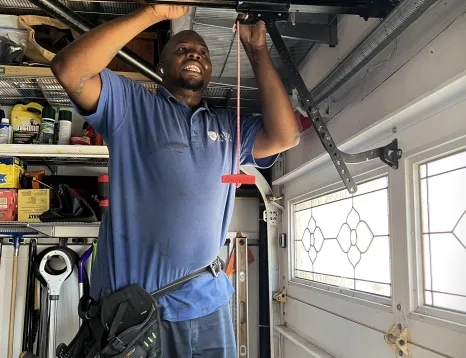A garage door is often the unsung hero of residential spaces, providing protection and comfort while enhancing your home's exterior. However, like any machine, garage doors are prone to deterioration, leading to possible problems that can disturb your daily routine. Whether it's a constant racket, a door that won’t budge, or a remote that refuses to respond, understanding the signals that your garage door needs urgent attention can save you effort and cash in the long run.
In this manual, we will examine frequent garage door problems and offer practical DIY fixing advice. You’ll learn how to troubleshoot loud garage doors, fix damaged springs, and even recognize when it's time to call in a specialist. With the correct insights and tools, you can manage many of these problems yourself, ensuring your garage door remains secure and operational. Let’s dive into the key actions you can take to maintain your garage door in optimal condition and avoid costly repairs down the road.
Indicators That Your Carriage Entrance Requires Repair
One of the first indicators that the garage entrance requires attention is unusual sounds during use. When one hear rattling, creaking, or thumping noises, it could indicate the entrance's parts are misaligned or damaged. Ignoring these noises may lead to greater issues in the future, so it is essential to explore the cause of the sound and address it immediately.
Another cautionary indicator is when the door is slow to open or lower. A garage door that operates slowly might have issues with its opener, springs, or tracks. Additionally, if the entrance wobbles or quivers excessively during use, this can indicate an unevenness or technical breakdown that needs urgent fix to avoid additional damage.

Irregular performance, such as the door not closing all the way or reversing unexpectedly, is also a serious sign that fixes are necessary. This unpredictable functioning could stem from problems with the detectors or alignment problems. Should you experience any of these symptoms, it is best to evaluate the situation immediately to maintain safety and prevent additional issues.
Frequent Garage Entrance Difficulties & Home Resolutions
An common problems homeowners experience is a garage door that won’t open or close. This issue can typically be traced to a defective sensor, a broken remote, or an problem with the power supply. Commence by inspecting the power source to make sure the opener is connected and has power. Afterward, examine the sensors at the base of the door; wipe any dirt or debris that may hinder their operation. If the remote isn’t working, swap the batteries and reconfigure it following the manufacturer’s guidelines.
Another frequent problem is rattling garage doors, which can be annoying. This noise often results from a lack of lubrication or damaged parts. To tackle this, use a silicone-based lubricant to the rollers, hinges, and tracks. Tightening loose bolts can also lessen noise significantly. If the grating persists, think about checking the rollers for wear and swap them if necessary. Keeping your garage door adequately lubricated not only minimizes noise but also increases its lifespan.
Jamming garage doors are also a problem, typically caused by bad alignment or blockages in the tracks. Make sure that the tracks are free from debris and that there are no physical barriers preventing smooth operation. If the door is not aligned, you may need to realign the mounting brackets or the track itself. Loosen the screws, adjust the door to the correct alignment, and secure the screws again. For more severe alignment issues, it may be required to call a professional, but regular maintenance can frequently prevent these problems from escalating.
When to Seek Professional Help
While countless garage door issues can be identified and fixed by homeowners, some circumstances arise that warrant the attention of a professional technician. If you have made efforts at DIY repairs but the problem persists, it is advised to consult an expert. garage doors portland oregon is especially valid for complex issues like defective garage door springs or faulty openers, where poor handling could lead to further damage or safety risks.
Moreover, if you observe signs of severe wear and tear on key parts or if your garage door is not operating smoothly, it is advisable to call in a professional. Overlooking these issues can lead to plausible accidents or larger repairs down the line. A qualified technician can assess the situation effectively and provide you with the right solutions to ensure your garage door functions securely and efficiently.
At the end, if you experience any odd noises, erratic movements, or if your garage door fails respond to the remote, consider get in touch for professional help. These symptoms could indicate deeper problems that require expertise and tools to fix, helping you avoid personal injury and costly repairs in the future.
